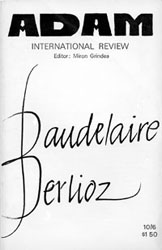
![]()
COLIN DAVIS’S BERLIOZ
by
John Warrack
© 1969-2012 John Warrack

 |
COLIN DAVIS’S BERLIOZby John Warrack © 1969-2012 John Warrack |
 |
Older concert-goers still treasure memories of Hamilton Harty’s Berlioz performances; most of us can recall Beecham’s inimitable glitter and cut and thrust, the suspended, timeless lyricism of his Royal Hunt and Storm, the diabolical urgency with which he drove the Symphonie Fantastique, above all that essentially Berliozian aristocratic poise chastened with melancholy. A new generation has learnt its Berlioz from Colin Davis, and learnt to find Berliozian beauties in works that were once barely heard of. Davis takes Berlioz on with total belief. Accept his large-scale structures, Davis seems to say, and they assume a brilliantly original logic of their own: the Romeo and Juliet symphony, instead of being a ragbag containing a few famous excerpts, becomes in his hands a subtle and complete musical penetration of Shakespeare, words and music brought into a novel and true relationship. Accept his much-abused harmony, and those long, surprising melodies assume their true ease and sense of direction; no other conductor has sensed how one emphasized chord, even a crescendo to one note, in the accompaniment can make the tune shine with meaning. Accept his orchestration in all its originality, and even such oddities as the flute/trombone chords in the Requiem become with Davis a necessary mystery. Everything that Berlioz wrote is to Davis part of him, not, according to the old legend, a series of failures to be set beside a few masterpieces that contain their own failed moments. And so we have learnt Berlioz as never before — the scope and scale of his imagination, the justified originality of his forms, the imagination he poured into songs, competition cantatas, other forgotten pieces that are now being resurrected and recognized with delight as containing his essence no less vividly than do the great masterpieces. Davis’s Les Troyens holds in true balance the epic grandeur of Berlioz’s Virgilian vision and the romantic intensity of its expression; his Damnation of Faust has within all the brilliant and touching incident Berlioz’s appalled sense of man’s loneliness; his Romeo reflects, above all in the great love scene, Berlioz’s intense response to transient beauty and happiness. For all the splendid vehemence of his performances, it is clarity that marks Davis’s view of Berlioz. He trusts Berlioz, and we are rewarded for his trust.
JOHN WARRACK
![]()
* We are most grateful to Dr Warrack for granting us permission to reproduce this article on this page.
We have transcribed the text of the article from the ADAM International Review, 1969, nos. 331-333, a copy of which is in our collection. We have not been able to contact the editor of the ADAM International Review, which has ceased publication.
![]()
The Hector Berlioz Website was created by Monir Tayeb and Michel Austin on 18 July 1997; this page created on 1 April 2012.
© Monir Tayeb and Michel Austin. All rights reserved.
![]() Back to Berlioz: Pioneers and Champions
Back to Berlioz: Pioneers and Champions
![]() Back to Original Contributions page
Back to Original Contributions page
![]() Back to Home Page
Back to Home Page
![]() Retour à la page Berlioz: Pionniers et
Partisans
Retour à la page Berlioz: Pionniers et
Partisans
![]() Retour à la page
Contributions originales
à ce site et autres articles
Retour à la page
Contributions originales
à ce site et autres articles
![]() Retour à la Page d’accueil
Retour à la Page d’accueil